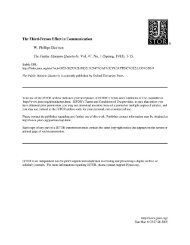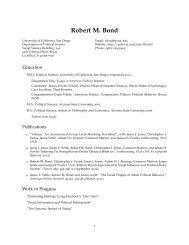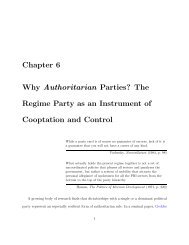Popkin-Reasoning Voter-Ch 3.pdf
Popkin-Reasoning Voter-Ch 3.pdf
Popkin-Reasoning Voter-Ch 3.pdf
Create successful ePaper yourself
Turn your PDF publications into a flip-book with our unique Google optimized e-Paper software.
60 <strong>Ch</strong>apter Three<br />
ture of American society have together affected relations between the<br />
political parties.as In 1952 more than two-thirds of all Americans were<br />
working-class; by 1976 less than half the country was working-class.<br />
Acceptance of the New Deal by Republicans made more working-class<br />
Democrats willing to vote for Republicans, and acceptance of the New Deal<br />
among middle-class Republicans made them more willing to vote for Democrats.<br />
This set of changes in society and the parties also means that<br />
campaigns matter more, for there are now fewer voters with one-sided<br />
views of the two pafties.<br />
when General Eisenhower was elected president, many upper-income<br />
and upper-status southern Democrats began to reassess their antipathy to<br />
the Republicans, and the first cracks in the "Solid South" became apparent<br />
even before the civil rights explosions of the 1960s.46 Throughout the<br />
country when Eisenhower made no attempt to repeal New Deal programs,<br />
Democratic antipathy to the Republican party was moderated. Further, as<br />
moderate Republican governors, particularly in the Northeast, courted<br />
unions and Catholics, the distinction between parties became less clear.<br />
When Republicans accepted the New Deal politically and socially, Democrats<br />
were willing to vote for them.aT The overwhelming vote against<br />
Goldwater in 1964 shows just how critical acceptance of the New Deal was<br />
to the Republican party.<br />
Evaluating Candidates<br />
The candidates themselves have more importance in the American system<br />
than in most other political systems. The American system vests power in a<br />
single individual with no formal ties to his party. The unity of the executive<br />
branch, the separation of the executive and legislative branches, and the<br />
weakness of the American party system combine to give the American<br />
president a degree of power and independence unknown in a parliamentary<br />
system.<br />
<strong>Voter</strong>s focus on the presidential candidate because American parties<br />
have never been teams unified behind a single centralized source of control,<br />
like parties in some other countries, and the president has a large eflect<br />
on his party's programs. The American federal system is characterized by<br />
widely dispersed patronage centers, local primaries, local fund-raising,<br />
and local party organizations. Presidents, therefore, have wide latitude in<br />
deciding what course to follow in ofrce.<br />
There has been, throughout the century an antiparty strain of reformism<br />
in America that argues for nonpartisan elections. Party labels, it is argued,<br />
give to voters the illusion of informed choice while allowing them to ignore<br />
.,;*rx&tW&;..<br />
1<br />
t<br />
i<br />
{<br />
t,<br />
Going without Data<br />
ttnlx)rtant differences between the candidates on the newly emerging isqrrt.s<br />
of the day. Tiake away party labels, the reformers argue, and voters will<br />
pay attention to the "real" differences between candidates onthe issues. In<br />
rr.ality, however, voters evaluate candidates and form their images of them<br />
hy using the same types of information shoftcuts they use to form their<br />
vlews of panies, and issue positions are by no means their only criteria in<br />
llrc cvaluation.as<br />
<strong>Voter</strong>s care about the competence of the candi@ndi-<br />
4otc'<br />
ost gove.nment ac-ti rity<br />
nrrrl because they care about what the candidate can deliver from qove,rn-<br />
lllgtlt. They care about the policy preferences of the nominee, not just the<br />
ltdrty's platform, because parties are coalitions that exercise weak controls<br />
ovcr presidents. And they worry about the character of the candidate,<br />
alrout his or her sincerity, because they cannot easily read "true" prefernr('cs<br />
and because they care about uncertain future situations.<br />
Competence versus Issue Proximity<br />
Irr an ideal, two-party, parliamentary democracy, it is assumed that voters<br />
Iu'.lctice "proximity voting"-vsfing for the candidate or party whose<br />
position is nearest to theirs. Under this assumption, however, voters con-<br />
Eklcr all candidates and parties equally able to carry out their promises. In<br />
rcrrlity, voters sometimes care less about candidates' issue positions than<br />
tlrcy do about which candidate can deliver the most on these issues, and<br />
wlrich candidate can do a better job of simply managing and running the<br />
H0vcrnment. In short, they care about competence.<br />
(iompetence is a relevant dimension of candidate evaluation for three<br />
t(.itsorlSl (l ) The candidate's competence directly affects the probability of<br />
Irls or her being able to deliver benefits from the system once elected.<br />
(2 ) Much of what both the president and Congress do involves the general<br />
nt.iltagement of the country. Since the voter has only limited information,<br />
Ire or she may vote for a candidate who seems capable of managing the<br />
allhirs of the country even if that candidate is not the "closest" to the voter's<br />
rpccific issue preferences. (3) Finally, if the candidate is elected, he or she<br />
wlll have to solve many problems that no one can anticipate on election<br />
rlrry. Competence in unfamiliar areas may be inferred from the perceived<br />
nlrttlletence of the candidate in other, more familiar, areas.<br />
Oompetence, then, is a measure of ability to handle a job, an assessment<br />
ul'lxrw effective the candidate will be in ofrce, of whether he or she can<br />
"get thlngs done." Many aspects of government are noticed only when<br />
rornethlng goes wrong, and in many other areas, maintaining minimal lev-<br />
6t











